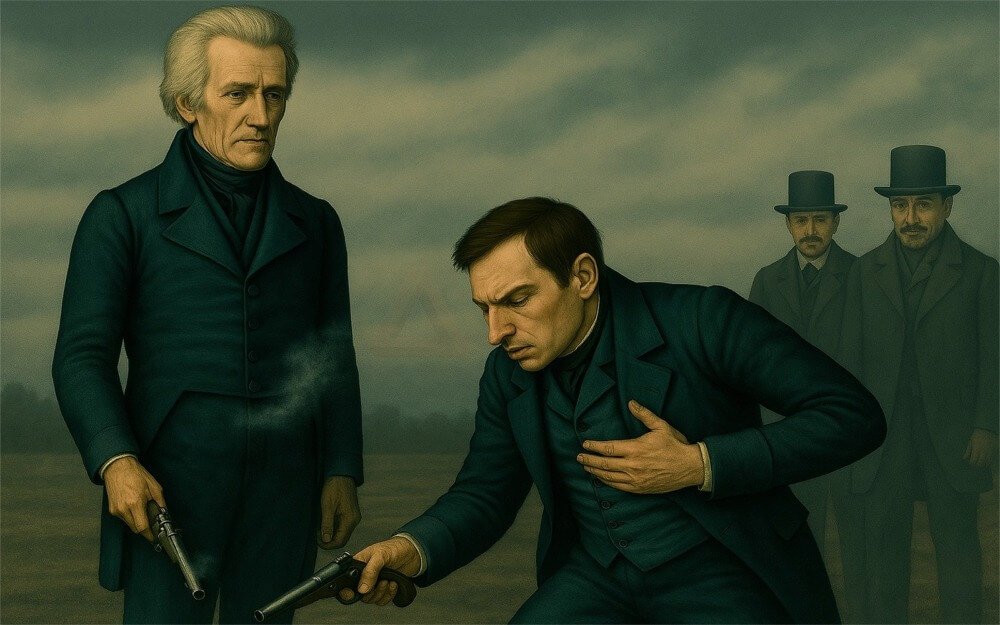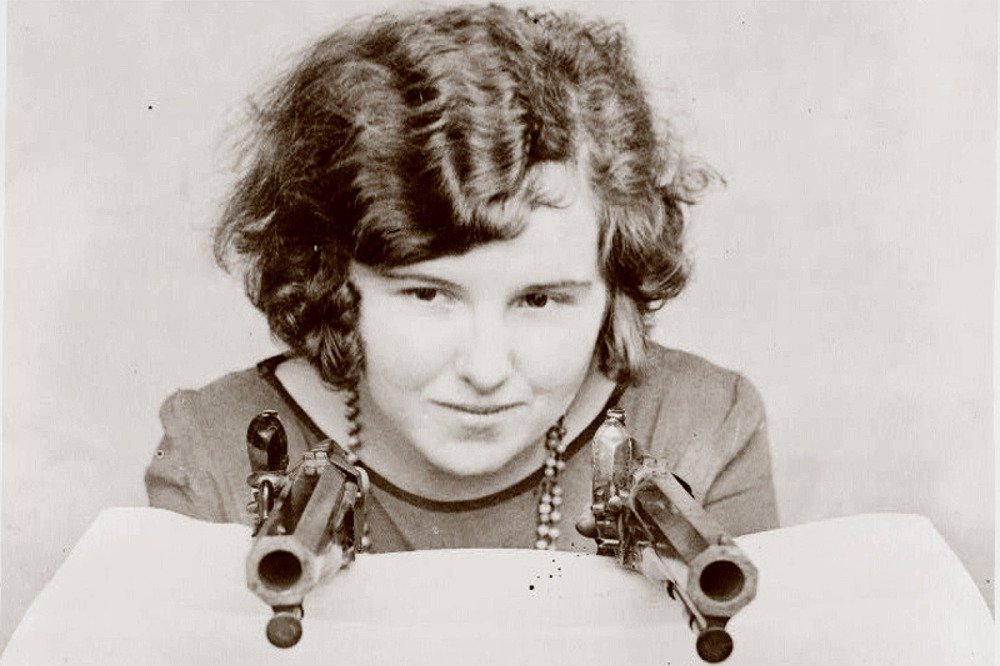
On a humid morning in May 1806, Andrew Jackson stood across from Charles Dickinson on the banks of Kentucky’s Red River. Dickinson, a gifted marksman and plantation owner, had insulted Jackson’s honour — and worse, his wife Rachel. What followed was one of the most infamous duels in American history: a single shot to Jackson’s chest, a misfire, a re-cock, and a fatal bullet that ended Dickinson’s life.
The Code of Honour: Why Jackson Fought
Duelling in Jackson’s era wasn’t just violence — it was ritual. Governed by the Code Duello, duels were meant to restore reputation, rather than to result in death. In the South, where honour was currency, a man’s willingness to risk death was often more important than the outcome.
Jackson issued challenges, served as a second, and fought at least four documented duels. Each revealed different facets of his character: he could be petulant, principled, and, at times, brutal.
Duel One – Bacon and Books with Waightstill Avery
In 1788, Jackson challenged Revolutionary War veteran Waightstill Avery after a courtroom humiliation. Avery had mocked Jackson’s legal reasoning and sarcastically referenced Bacon’s Elements of the Common Laws of England. Jackson retaliated with a prank—replacing Avery’s law book with a side of bacon — and then issued a written challenge.
Both men met with seconds and fired into the air. Honour was satisfied, and they parted as friends.
Duel Two – Blood and Scandal with Charles Dickinson
Jackson’s duel with Dickinson began over a horse race but escalated when Dickinson publicly called Jackson a coward and accused Rachel Jackson of bigamy. On May 30, 1806, Dickinson fired first, striking Jackson in the chest near his heart. Jackson absorbed the blow, raised his pistol, and attempted to fire, but the weapon failed to discharge. He then re-cocked it and fired a fatal shot, killing Dickinson.
Though controversial, Jackson’s actions were not outside the bounds of duelling etiquette at the time. The re-cocking was permitted under the Code Duello, though it fueled public debate and scandal. The bullet that injured Jackson was never removed and caused him chronic health issues for the rest of his life.
Duel Three – The Duel That Never Was: John Sevier
Andrew Jackson’s feud with Tennessee governor John Sevier was a very shabby affair. When Sevier was reelected to office in 1803, Jackson was in command of the Tennessee Militia, and the two men detested each other. During the election campaign, Jackson had accused Sevier of bribery and fraud.
Following his inauguration, Sevier confronted Jackson in Knoxville, Tennessee. Their heated exchange quickly escalated into name-calling. When Sevier insulted Jackson’s wife, shots were fired, and Jackson had to be led away from the scene. The next day, Jackson sent a letter to Sevier, challenging him to a duel, and Sevier accepted.
Jackson arrived at the agreed time and location, but Sevier was nowhere to be seen. After waiting for a while, Jackson decided to leave when it became clear that Sevier wouldn’t show up. However, on his way back to Knoxville, Jackson encountered Sevier’s party, which was stalled on the road.
Jackson charged at Sevier on horseback, causing Sevier to fall from his horse, which then ran away with his firearms. Stunned, Sevier ran and hid behind a tree. Gun drawn, Jackson went after him.
Eventually, order was restored, and both parties agreed to leave the scene without further conflict.
Duel Four – Hotel Brawl with Thomas Hart Benton
In 1813, Jackson’s feud with Thomas Hart Benton erupted when Jackson served as second in a duel involving Benton’s brother. Benton denounced Jackson publicly. Months later, a hotel brawl ended with Jesse Benton shooting Jackson in the arm. Jackson refused amputation, declaring, “I’ll keep my arm.” The bullet remained lodged until his presidency.
Ironically, Benton later became one of Jackson’s closest allies in the Senate.

Myth and Multiplicity – How Many Duels Did Jackson Really Fight?
Speculation about Jackson’s duelling record has long blurred the line between fact and folklore. Some accounts claim he was involved in as many as a hundred duels. Although only two — Avery and Dickinson — are confirmed to have reached the field.
Jackson’s reputation as a man who “would fight at the drop of a hat—and drop the hat himself” was cultivated deliberately. Many challenges never reached the field. Seconds intervened, opponents backed down, or Jackson redirected his fury into tavern brawls and roadside standoffs.
The myth of “a hundred duels” reflects not a literal count but a cultural perception: Andrew Jackson as the embodiment of frontier honour, always armed, always ready.
Conclusion – A Legacy Etched in Lead
Andrew Jackson’s duels weren’t isolated incidents; they were chapters in a larger narrative of frontier justice, political survival, and personal mythmaking. They shaped his image, tested his resilience, and defined his presidency. In an age where honour was life, Jackson chose survival. And in doing so, he became a symbol of a nation still wrestling with its own code of conduct.
🔗 Think that was strange? There’s more. Explore our full Oval Office Oddities archive.
References:
1. Wyatt-Brown, B. (1997). Andrew Jackson’s honor. *Journal of the Early Republic*, 17(1), 1–36. https://www.jstor.org/stable/3124443
2. Blakemore, E. (2015, June 12). Andrew Jackson’s duels. *JSTOR Daily*. https://daily.jstor.org/andrew-jacksons-duels/
3. Brammer, R. (2015, April 15). Frontier racing and injured pride: The duel between Andrew Jackson and Charles Dickinson. *Library of Congress – In Custodia Legis*. https://blogs.loc.gov/law/2015/04/frontier-racing-and-injured-pride-the-duel-between-andrew-jackson-and-charles-dickinson/
4. Moore, J. T. (1975). The death of the duel: The Code Duello in Readjuster Virginia, 1879–1883. *The Virginia Magazine of History and Biography*, 83(3), 259–276. https://www.jstor.org/stable/4247961
5. Farrell, J. (n.d.). Dueling: The violence of gentlemen. *National Endowment for the Humanities*. https://www.neh.gov/article/dueling-violence-gentlemen
